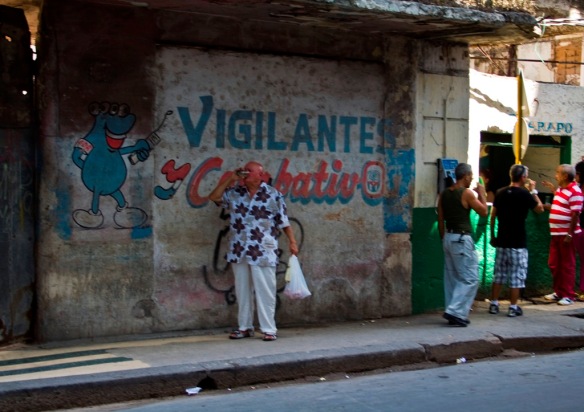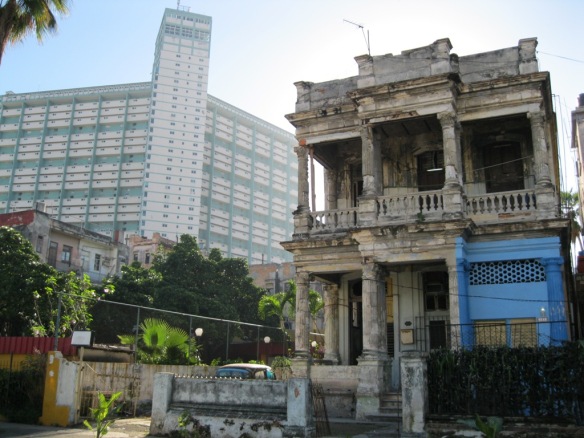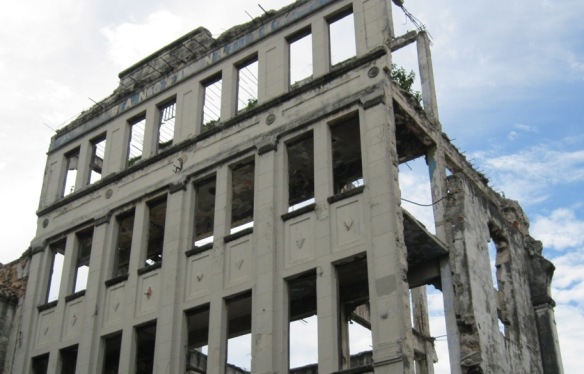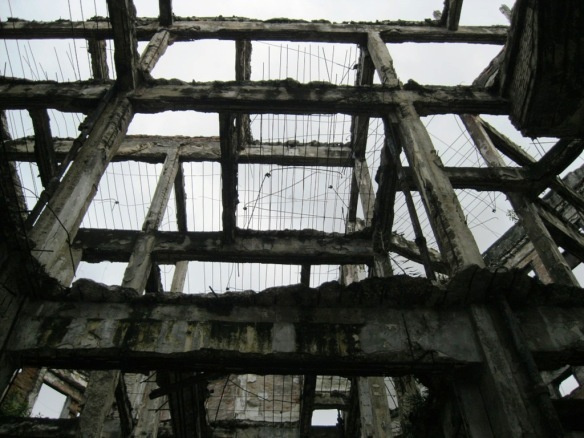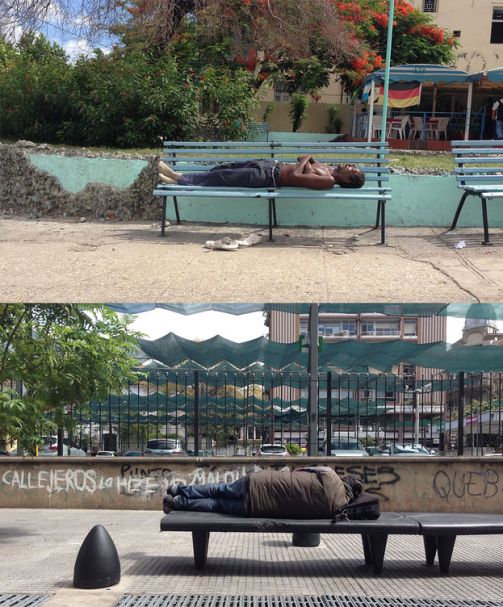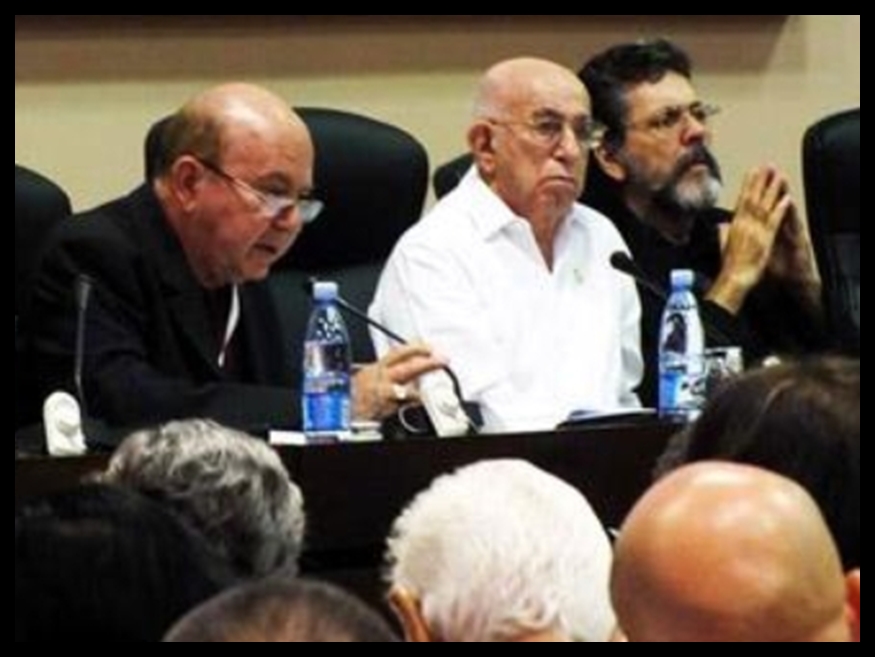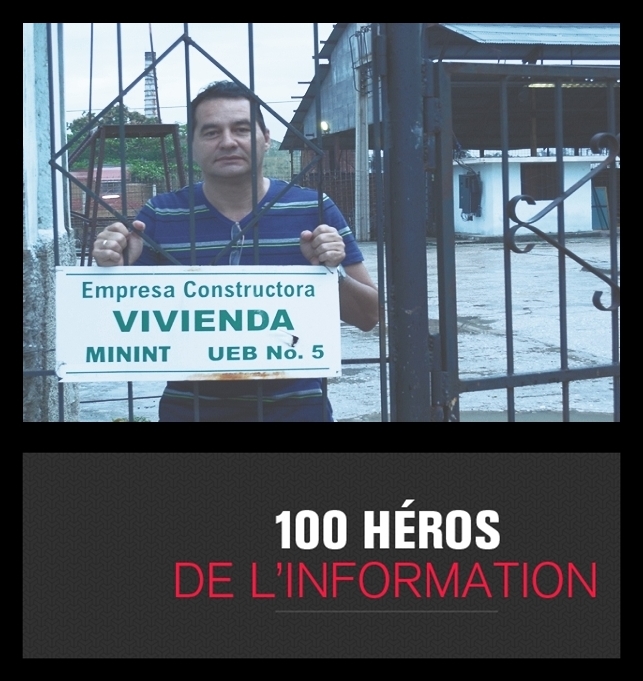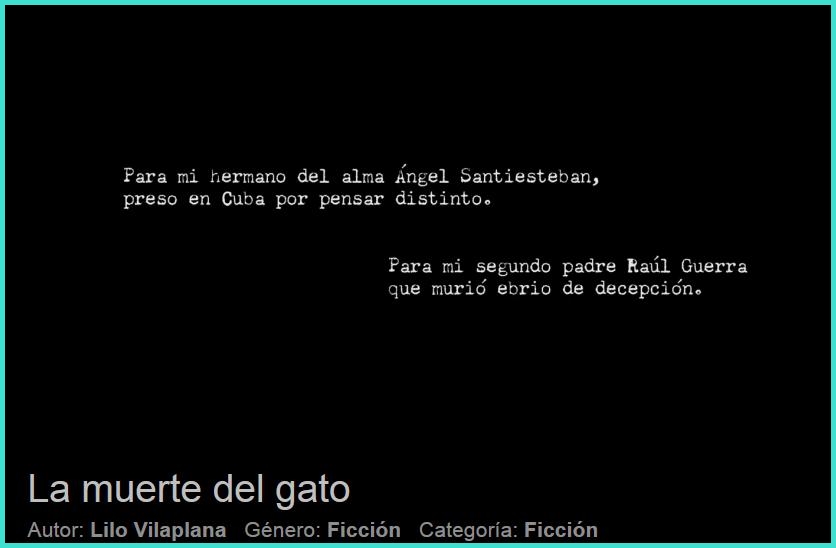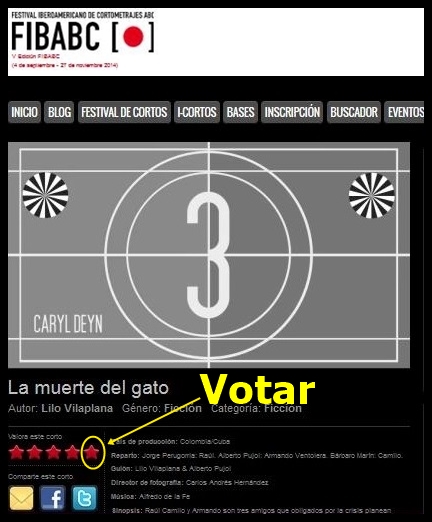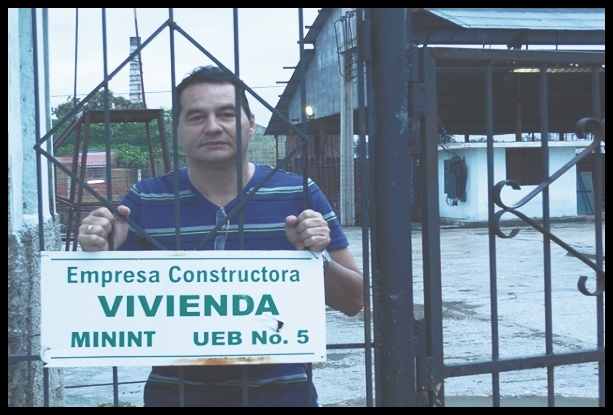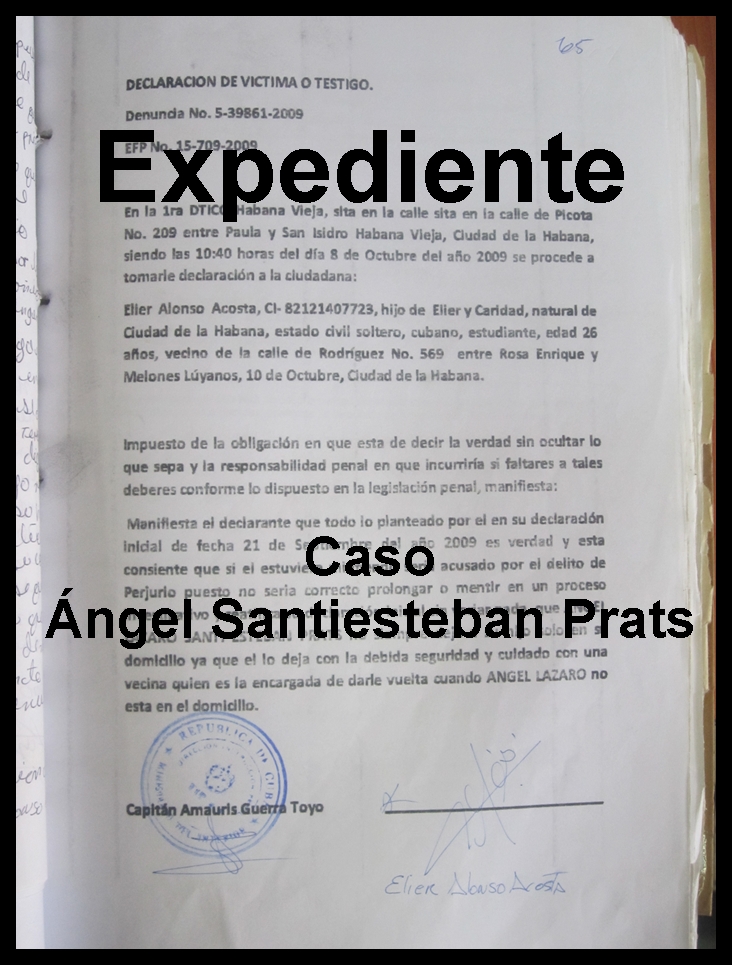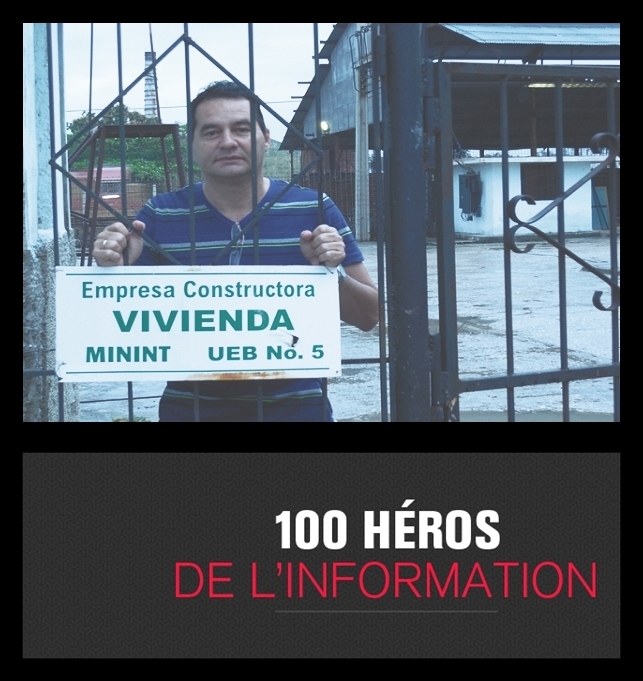29 September 2014
Could Havana be a “Wonder City”? / Luzbely Escobar
The number of foreigners living in Cuba has dropped dramatically / 14ymedio

14ymedio, Havana, 30 September 2014 – The National Statistics Office recorded a sharp drop in the number of foreign residents in Cuba, which in 2012 represented only 0.05 percent of the population. The figure is well below the 15 percent share of the foreign population based on the Island during the 1970s.
These data are included in the census conducted in 2012, which also points to a growing trend of population shift to Cuba’s cities, especially toward Havana. Of those who migrate internally in Cuba, 46.1 percent are men.
A note in the newspaper Granma notes that people who move to Havana Come primarily from the provinces of Holguín, Granma, Santiago de Cuba and Guantanamo. Proportionally Havana is also the province with the largest number of native residents who do not emigrate—followed by Mayabeque, Matanzas and Artemis, while Guantánamo keeps the smallest number of its natives followed by Pinar del Rio and Cienfuegos.
The search for better pay as well as better opportunities to improve one’s condition and for recreations were the main reasons that sparked internal migration.
Tiananmen Returns / Yoani Sanchez

14ymedio, Yoani Sanchez, Havana, 30 September 2014 – Memory can rarely be put to rest. Memories don’t understand permissions or authorizations, they return, period. For a quarter of a century the Chinese government has tried to erase the events of Tiananmen Square, but now the thousands of young people who are protesting on the streets of Hong Kong evoke them. It’s hard not to think of that man with the shopping bag stationed in front of tank, while looking at these people who demand the resignation of an official as servile to Beijing as he is unpopular.
Twenty-five years of trying to clean up the official history of what happened in that other social explosion that ended in the most brutal repression hasn’t accomplished much. Those streets full of peaceful but exhausted people show it. However, there are also great differences between the 1989 revolt in the Asian giant and the current demonstrations in their “special administrative region.” The fundamental change is that we are participants—from our televisions, digital newspapers and social networks—in every moment the people of Hong Kong are experiencing. The lack of information that surrounded the Tiananmen Square protests now has its counterpart in a barrage of tweets, photos and videos coming from thousands of mobile phones
For how many years will the Chinese government try to erase what is happening today? How will they strengthen the Great Firewall within the country so that people don’t know what is happening so close by? The violent repression of last Sunday only serves to add to the determination and the number of protestors in the streets of the ex-British colony. However, despite the multitudes and the numerous digital screens shining in the Hong Kong night, memory persists in taking us back to one man. An individual who was returning from the market and decided that the treads of a tank were not going to crush his remaining civility. Twenty-five years later, reality is echoing his gesture.
The Fragrance of Sacred Symbols / 14ymedio
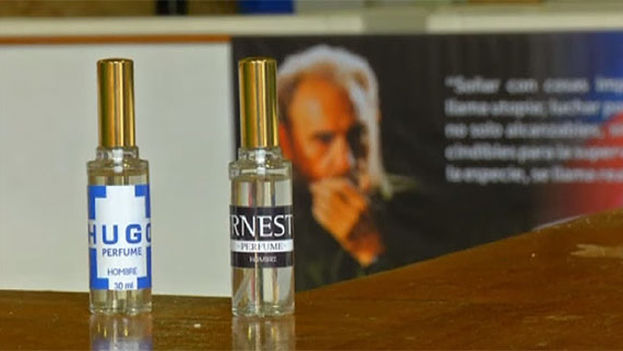
14ymedio, Havana, N. Mell – 29 September 2014 – Since an official statement published in the newspaper Granma last Saturday, rejecting the planned marketing by the Cuban company Labiofam of perfumes named after Ernest Guevara and Hugo Chavez, the controversy about who is really responsible for this “grave error” continues to animate conversations.
The omissions in the statement from the Council of Ministers are very significant. For example, there is no mention that this business group, responsible for the production of biopharmaceuticals and chemicals, is under the Ministry of Agriculture. Instead, it is treated as an organism of the central state administration. More surprising is the hiding of the fact that this isn’t the first time they have announced the creation of perfumes named after personalities connected to the Revolutionary epic.
Fidel and Raul Castro’s nephew has ruled the company with the same voluntarism that his uncles have ruled the island
Fidel and Raul Castro’s nephew has ruled the company with the same voluntarism that his uncles have ruled the island. There is nothing in the company that hasn’t been thought up, or at least approved, by him, including the weekly menu in the workers’ cafeteria. And, even though the company has fallen short of its planned performance for the last five years, it has been presented as a model institution of modern times and its hierarchy as untouchable beings.
It hasn’t been disclosed if the disciplinary measures announced by the Council of Ministers Executive Committee will seek a scapegoat to save the reputation of the CEO, or if the flames will reach the top of the pyramid. There are many threads behind the intrigue, each one pulling in a different direction.
The ideological and emotional argument that “symbols are sacred” convinces almost no one, especially in a country where the face of Che Guevara himself appears tarnishing the national flag in ashtrays where cigarettes are crushed to extinction. Maybe Labiofam believed that an independent company is governed more by the rules of marketing than by the designs of the Party, or maybe the time has come to end a feud over whose “remains” new interests already have their eyes on.
*Translator’s note: Fidel’s middle name is Alejandro
Former Deputy Minister of Sugar Sentenced to 20 Years in Prison for Corruption / 14ymedio

14ymedio, 29 September 2014 – Fourteen Cubans have been sentenced to between 6 and 20 years in prison in the corruption case known as “Tokmakjian.” Nelson Labrada, the Sugar deputy minister and Ernesto Gomex, former director of the state mining company Ferro, are among the group and have been sentenced to 20 years and 12 years in prison, respectively.
The case, which raised great concern among investors in Cuban businesses, tried several Cuban and foreign businessmen for the crimes of bribery, forgery of bank documents, fraud, trafficking in hard currency and tax evasion associated tih the Tokmakjian Group. The Canadian company had businesses in Cuba for for more than twenty years, particularly in sales of transportation equipment, mining and construction.
Last Saturday the conviction of Cy Tokmakjian, age 74 and founder of group, was sentenced to 15 years, of which he has already served three since his arrest. Claudio Vetere, company spokesperson, and Chief Financial Officer Marco Puche, were sentenced to 12 and 8 years in prison respectively. Cuba also seized about $ 100 million in company assets.
Street people / Reinaldo Escobar
In the two photos that I compare here I am not intending to insinuate that it’s the same in Buenos Aires as in Havana, because there will always be people sleeping on the street.
The Havanan (or maybe he is from another province) who sleeps shirtless in the full sun on the centrally-located Avenue of the Presidents at the corner of 23rd, in the heart of El Vedado, has left his shoes in reach of anyone who might steal them, figuring, perhaps, that there’s no one more poor than he. The pants he is wearing are tied with something that clearly isn’t a belt, and one could wager that he has ingested a goodly dose of alcohol. In the background, a reminder of the World Cup, the Argentine flag flies accompanied by one from Germany and another from Brazil.
The Argentine (probably an immigrant) protects himself from a slight chill with perhaps too many clothes and has something like a briefcase for a pillow. His image could illustrate the drama of many unemployed, people who have seen their lives shattered with the latest crisis. Behind him are more or less luxurious cars, contrasting with his misery. On the walls are the libertarian slogans of some graffiti artists that nobody has bothered to paint over. The street looks clean and everyone who passes by ignores him.
If they are sleeping they are dreaming of different, but equally unattainable, things.
28 September 2014
The High Cost of the Five / Fernando Damaso
The trial in which the five Cuban spies were found guilty and sentenced to prison — a place where they enjoy internet access, regular phone calls, the means to entertain themselves (painting supplies, tools for writing poetry, etc.), sanitary living conditions, comfortable jail cells, medical care, nutritious food, gym facilities, a wardrobe and other comforts — has cost and continues to cost the American taxpayer a tidy sum of money.
However, it has undoubtedly cost the Cuban people even more. We are the ones paying the high salaries of their lawyers. Through our embassies overseas we pay to support the various solidarity groups seeking their release, the members of which are also invited as political tourists on all-expense-paid visits to Cuba.
As though that were not enough, there are also the round-trip airline tickets for all their extended family members, who routinely visit them in prison and proselytize on their behalf. There are also the costs associated with providing these family members with wardrobes, spending money, food and lodging. Add to this the expenses for the spies who have already been released and who now serve as international spokespersons.
There is the ongoing expense of demonstrations of support in Cuban schools, factories and businesses. There are the marches, rallies and concerts in their honor, the art exhibitions, the books dedicated to them, and many other such commemorations.
Considering all the people held in detention, it is fortunate that only these five — members of the so-called Wasp Network — have agreed to become heroes by decree. Otherwise, the costs for both the American and Cuban taxpayer would be exponentially greater.
25 September 2014
“J’Accuse” from a High Position / 14ymedio
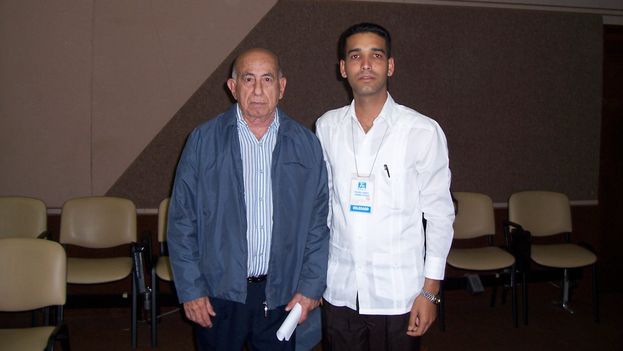
An official with the Housing Institute denounces corruption and privileges, as well as reprisals taken against his family.
14ymedio, September 24, 2014 – Before leaving Cuba in October, 2013, the author of this accusation occupied an important post at the Housing Institute and, as a jurist, saw firsthand the intrigues perpetrated by high-level officers of the agency to illegally grant properties to elites and friends. As is shown in the accompanying photos, Juan Carlos Gálvez Migueles was an active participant in the political life of the Island. On December 14, 2008, Gálvez was elected to the national secretariat of the Committees for the Defense of the Revolution, and ratified as a member of the executive committee of that organization.
A lawyer by profession, Gálvez worked as a counterintelligence officer following his studies at the Eliseo Reyes Rodríguez “Capitán San Luis” Advanced Institute of the Interior Ministry. His problems started when he refused to collaborate in the legalization of mansions belonging to the children of ex-President Fidel Castro.
“I was disappointed in many things about the system that were drummed into me and that I was taught to defend. The blindfold fell from my eyes when I saw the problems of daily life in the real world of the average Cuban,” Gálvez told 14ymedio in an email exchange. “That system is not made for honest, sincere, hardworking people like me, where the more corrupt one is, the better.”
My Duty is to Denounce – I Am Not Afraid
by: Juan Carlos Gálvez Migueles
By these presents I wish to make a public statement about the violation being committed by officials of the Cuban State who represent the Provincial Housing Administration of Havana, against three women and a girl of just one year of age, with the intent of evicting them from the property located on 3rd Street, Building 15022, Apt. 10, between 7th and N streets, Altahabana neighborhood, Boyeros municipality. These women are: Sara Elvira Migueles Velo, 47-years-old; Rosaima Rodríguez Migueles, 17-years-old; Marinelvis Martínez Migueles, 24-year-old, mother of a one-year-old girl, named Aynoa. They are, respectively, my mother, sisters and niece.
The property from which the authorities want to remove them was acquired by this writer in May, 2012, when I was appointed Principal Specialist of the Havana Provincial Housing legal division, while in process of being named assistant legal director of this agency.
In August of 2013, I was accepted to participate in an advanced public administration course at the University of Extremadura, Spain. However, the Spanish embassy did not grant me a visa because I missed the deadline to submit some required original documents. At that point I decided to leave Cuba for good, due to various reasons that at present I don’t believe it opportune to divulge.
To facilitate my departure I took advantage of the opportunity provided by this course and requested authorizaton by the Provincial Housing Director, Liudmila Mejias Ocaña, to approve my attending this course. In reality, I was leaving for another country but I could not say where I was going, because right away my family’s home would be taken away, as is happening right now. Besides, I also could not disclose what I was up to, because I had been a member of the Interior Ministry and had ties to high-level officials stemming from the duties I carried out.
In October, 2013, I left Cuba, keeping my new home base a secret, until January, 2014, when it becomes known. It was then, in a gesture of cruelty and bad faith, that the Provincial Director of Housing and Assistant Legal Director, Marbelis Velázquez Reyes, imposed a disciplinary measure on me of final separation from the agency for unjustified absences. This is a measure that violates Decree 302 of October 11, 2012, which in turn modifies Law No. 1312, “Migration,” of September 20, 1976, given that what should have been applied in my case was a leave of absence from my position.
But her objective was to take revenge because I had already been selected as assistant provincial legal director. Therefore, she had to attack my family, declaring them illegal occupants without right to relocation, knowing that they had no place of origin. Then, where will they be taken to live? On the street, to a temporary community shelter? I don’t believe this is just or honorable.
Therefore, I am bound to make this accusation:
I was asked to work on the legalization of the houses owned by the children of ex-President Fidel Castro Ruz, all homes that consisted of more than 500 square meters of living space, comprising more than 1000 meters of total lot space, surrounded by hundreds of meters of addition land. I refused to do this, based on it being in violation of the current General Housing Law No. 65, which only recognizes properties up to 800 meters in size.
I was asked to work on the legalization of the houses owned by the children of ex-President Fidel Castro Ruz, all homes that consisted of more than 500 square meters of living space.
These individuals, by virtue of being offspring of a leader, have more rights to a good home than my family. I ask: What do they contribute to society that I haven’t? In what war did they serve? What have they done that is special? Why do these citizens have to have an interior ministry official representing them in their legalization proceedings?
Are they different from other Cubans? Can they not go to the municipal housing administration like other citizens? Could it be that they cannot wait in line? Can they not observe the waiting period established by law? Are they subject to a different law that I was not taught at the Advanced Institute of the Interior Ministry, when I was pursuing my degree in law and operative investigation of counterintelligence? Where is the equality that we so proclaim to the world?
Another case is that of Marino Murillo Jorge, vice-president of the Council of Ministers, to whom was granted a grand residence – or rather, a mansion in the Playa district, in return for an apartment he owned in Cerro municipality. But the irony is that the property Murillo was granted was assigned to the Ministry of Education and, with supposedly just the authorization of Raúl Castro Ruz, it was transferred to the ownership of this citizen without any disentailment process and, hence, no discussion.
Perhaps this citizen, for occupying a high post in the Cuban government, has more right to a dignified home than my family? What merits does he have that hundreds of thousands of Cubans, as educated as he or more so, do not?
I can also speak to the favors granted to officials of the National Housing Institute such as the house that was exchanged for the president of this agency, Oris Silvia Fernández Hernández, a grand property, which originated in a confiscation. Could it be that she has more rights than my family? Does the legal director of the National Housing Institute also have more rights than my family, a corrupt individual who has been sanctioned and yet remains in his post? I could go on naming any number of high State officials.
The granting of housing is decided in the office of the Provincial Director in favor of individuals who pay up to 5000 CUCs.
I denounce how thousands of families live in unhealthy conditions in temporary community shelters. They are not granted public housing, this being a responsibility of the Provincial Housing Director, Liudmila Mejías Ocaña, who does not control the administration of the Provincial Housing Commission. The granting of housing is decided in the office of the Provincial Director in favor of individuals who pay up to 5000 CUCs, friends who give gifts, as well as high-level officials, and relatives and lovers of high-level officials. All of this is public knowledge and has been condemned on various occasions but, as there is so much intrigue that involves high-level officials, nothing happens.
I denounce how legal documents are worked up in the Provincial Housing Office to favor these same people, all under the Thirteenth Special Ruling on Law No. 65 (General Housing Law), being concluded in record time, while the documents in other cases go to eternal rest. Those responsible are the Provincial Director, and the Assistant Legal Director, Marbelis Velazquez Reyes. The latter owns a fine house that was disentailed to her after seven years, very well furnished and equipped, while she earns a monthly salary of only 500 Cuban pesos.
I denounce how my family, on September 17, asked to be seen at the Council of State of the Republic of Cuba to present their case and were refused attention, the officials alleging that only letters are accepted at that location and nobody is seen in-person – an unheard-of and ill-intentioned assertion. This is not the democracy promised by our rule of law.
In similar fashion, they went before the Provincial Party Committee of Havana and the officials who saw them during a public hearing told them to go before the Municipal Administrative Council of Boyeros and, if their problem was not resolved there, they should go before the Provincial Administrative Council of Havana. As we would say in Cuban, it was a ball game, back and forth.
I should ask, why not lease the property to my family? For whom is this property being reserved? It could be that this apartment is already sold, or is being set aside for a friend.
Surely when this accusation comes to light, they will begin to question me about where I obtained the money to leave Cuba. Well, it was from the sale of the deplorable house that my mother owned and a landline telephone that I had in my name, money that I supplemented with funds from a friend who was my older sister’s boyfriend.
I ask that the right of my family to live in a decent home be respected, that events will not be repeated like those we endured when for more than 10 years we lived in a wooden building that was falling apart, where we would bathe in the kitchen, and defecate in nylon bags because we had no toilet. At that time I was a delegate to the Municipal Assembly of Popular Power of San Nicolás de Bari, today Mayabeque province.
My neighbors there and those who voted me in can attest to this. That was also the time that I served as Municipal Housing Director and never did I take even one concrete block for my house – a fact that my employees can corroborate. What did I gain from being so humble, so honest, that now my family should be treated in this manner. For all of this I decided to leave my homeland.
I declare that today I fear for the lives of my family in Cuba, for possible reprisals against them, resulting from this accusation and others that I may be forced to make to defend our rights. By the same token I fear for my life in this country where I reside, for having information about officials, for having been myself a member of the Cuban counterintelligence and someone who knows the methods they employ.
Translated by Alicia Barraqué Ellison
Hey, “Mamá Iné”!… Are We Out of Coffee Too? / Miriam Celaya
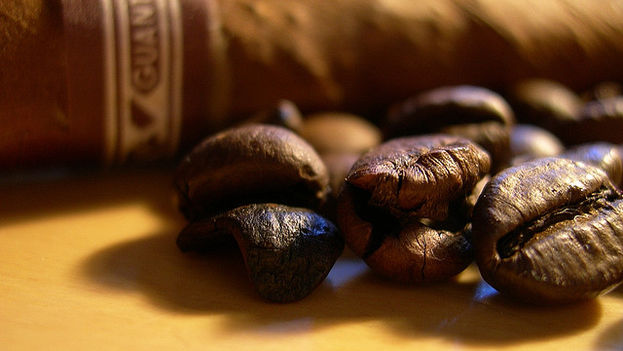
14ymedio, Havana, Miriam Celaya, 5 September 2014 — On Wednesday September 3rd, the official press conveyed another grim announcement to the Cuban people. Granma wrote: “The coffee harvest, newly launched in the province of Guantánamo, in eastern-most Cuba, will be ‘small’, with a decrease of 33% compared to the previous year.” The news adds to what appears to be the new information strategy (Raul-style “transparency”?) consisting in offering on newscasts on radio and TV, and in newspapers, a trickling of notes, articles and reports that show some negative figures on the Cuban economy, conveniently interspersed with other usual triumphalist breath. As a common denominator, such reports also bring proposals for typical solutions: calls for efficiency and “systematic actions” to ensure increased productivity to compensate for the economic debacle that is about to hit.
Thus, this crop will produce 342 fewer tons of coffee despite the installation of “another seven ecological pulp-extracting facilities” that will increase industrial performance to “reach 4.02 pounds per each can that will benefit”, superior to the previous coffee harvest figure. And, though we have not experienced severe weather to justify the lower production, and though they do not offer details about possible causes for the decreased harvest, everything is a prelude to coffee –as the sugar crop in previous years – is another traditional economic line in Cuba headed for extinction.
The Birth of a Tradition
Coffee is an essential component of our national culture, strongly rooted in our consumption and traditional customs, both at the family and at the social level since its introduction in Cuba in the late 18th century by French planters fleeing from the rebellion of slaves in the neighboring island of Haiti. continue reading
In the early 19th century, wealthy Cuban coffee plantations flourished, especially in the southeastern part, contributing since then to the economic wealth and to the development of another form of agricultural technology in the country which became cemented definitively in the 20th century, when coffee production reached its highest standards of quality and quantity.
There were no neighborhood stores without the typical aroma stemming from coffee grinders.
With the coffee boom and the reduction in prices, consumption of the aromatic infusion among the Cuban population increased, including among the poorest levels, replacing cocoa in popular consumption.
A recognition of the importance of this agricultural branch in the history and cultural identity of the country was the recording of the Archaeological Landscape of the First Coffee Plantations in Cuba’s Southeast as a World Heritage Site in 2000, based on the specifics of a tradition whose first material tracks, which are still preserved, constitute “a unique example of pioneer form of agriculture” and “substantially illuminate the technological, economic and social history of the Caribbean and Latin America” (Proceedings of the UNESCO World Heritage).
In recent decades, coffee, like all domestic products, has been marked by the rapid economic decline and decay that is affecting the entire Cuban economy. The causes are the same as the ones that ruined the sugar industry and the rest of the national socio-economic life: political voluntarism and extreme centralization of a totally unproductive and inefficient system.
The disaster has been gradual but steady, and it’s reflected in the practice of coffee consumption and contamination of the product, with additions to stretch it and cover at least the meager allowance of 115 grams (4 ounces) as the monthly ration, a 50-50 mixture of the lowest quality coffee and green peas. The palates of millions of Cubans have been corrupted with the resulting brew, to the point that many do not know or have forgotten the true taste and aroma of the fragrant bean.
But Cuban coffee made its mark not only on tangible items such as production and consumption, but it also etched and enriched our national spiritual life via the most unlikely and varied artists and performers. Thus, the green coffee plantations became an integral part of the Cuban rural landscape, while in urban spaces coffee shops proliferated, and there wasn’t a neighborhood store without the typical aroma from the coffee grinders.
Poetry too, painting, and even music were inspired by coffee in some of the best known works of Cuban art. Suffice it to remember the retro song that the unforgettable Rita Montaner made popular in the first half of the last century, with that refrain that became perpetuated in our popular folklore: “Ay, Mamma Inez, Ay, Mamma Inez, all of us negroes drink coffee,” flatly denying that principle that was both fallacious and racist that once called the infusion “the black nectar of the white gods”.
Cuban coffee today
Today, coffee has become scarce even on the shelves of stores operating in “convertible pesos” (CUC), in spite of imports of beans marketed by French or Spanish companies and by Vietnam, which became a coffee producer with the assistance of Cuban experts.
Today, coffee agricultural tradition is dying in Cuba. Perhaps it is fortunate that UNESCO has recorded the ruins of our nineteenth-century coffee plantations in the list of World Heritage sites. It may be that, after the passing of the olive green plague, this will be the only vestige left of what once was one of the finest.
Translated by Norma Whiting
The “Hero” Who Couldn’t Find the Entrance / Angel Santiesteban
A great truth was revealed at the VIII Conference of the National Union of Writers and Artists of Cuba (UNEAC, by its Spanish initials).
We have to admit when our detractors speak the truth. There’s no other option than –for the sake of honesty– to accept how right they’ve been. Therefore, I have to admit that, yes, “The UNEAC is the Moncada of culture”*. It’s impossible to state it any clearer, for we know well the political, human, logistic, and leadership failures that the assault on the Moncada Barracks in 1953 symbolized, when the immature and terribly suspicious Fidel Castro stationed a select group to practice their aim in Santiago de Cuba. With neither suitable arms nor adequate preparations to confront the army, he sent them to a certain death.
How can intellectuals pretend not to recognize Fidel Castro’s cowardice, who — in spite of having gone to school in that city and having planned the attack — couldn’t find the entrance to the barracks, when those who had never been there were able to get behind its walls?
It is infuriating to watch that documentary where Fidel Castro, leaning on a car of that era, explains how he was unable to find the entrance, yet the cars traveling ahead and behind him managed to penetrate the garrison, whose entrance is of such a size that a blind man could find it! But we already know that there’s nothing worse than one who doesn’t want to see what’s in front of him.
That wasn’t his only mistake. We know that, throughout the entire struggle of the Rebel Army, he never participated in a single battle; and he advised Raul Castro to do likewise: while leading his comrades in the midst of combat, the latter would abandon the fight only to appear days later when the town square had been taken. Fidel Castro not only couldn’t find the entrance, he was unable to follow the sounds of gunfire on that fateful morning, nor could he redirect himself towards other posts during the shootout. On the contrary, he remained huddled, waiting for the end, and when he learned his soldiers were dead or captured, he sought shelter in a hole in order to finally turn himself in to the Catholic Church (which he never thanked for saving him), and reemerge as the hero.
Certainly, seen as a failure (the only way to comprehend this event), without a doubt, as the president of the UNEAC, Miguel Barnet, put it: “The UNEAC is the Moncada of culture”. He’s never been more right.
Angel Santiesteban-Prats
Lawton Prison Compound. April, 2014
* Santiesteban is referring to the speech by Miguel Barnet at the opening of the VIII UNEAC Conference.
Translated by: Yoyi el Monaguillo
Sign the petition so that Amnesty International will declare the Cuban dissident Ángel Santiesteban a prisoner of conscience.
23 May 2014
Let’s Join "The Death of The Cat" in Denouncing the Castro Dictatorship at FIBABC
For my soul brother Angel Santiesteban, prisoner of Cuba for thinking differently.
For my second father, Raul Guerra, who died intoxicated with disappointment.
The Death of the Cat
Writer: Lilo Vilaplana Genre: Fiction Category: Fiction
The Death of the Cat is much more than an exceptionally accomplished work of art by Lilo Vilaplana. It is an unambiguous argument against the Castro dictatorship that has plagued Cuba for fifty-six years.
It deeply impacts Cubans who have lived that period, those who even if they have not lived it suffer even today the same painful reality, and the non-Cubans who are moved seeing how the Castro propaganda has fooled them also while all Cubans are prisoners of the big island jail.
Dedicated to Angel Santiesteban and Raul Guerra, it deals with a work of fiction inspired by real events, contextualized in the day after the shooting of General Ochoa but that takes great care with even the smallest details managing to recreate on a Bogota lot the miseries of one Havanan.
Details as “trifling” as to have covered the floor with a paper that mimics the tiles that populate Cuba. And even the wretched roll that Cubans eat, many preliminary experiments were needed until obtaining what appears in the short film, seeking not to exceed the weight and to be true to what the impoverished people eat.
It is not easy to create intentionally so much destruction, poverty and neglect as the Castros have caused in over five decades. Painstaking craftsmanship by Lilo’s team has managed to “destroy” the setting, making it so true to life that more than one person will believe that it really was filmed in Havana. continue reading
The director’s merit, and it is great, is not only artistic. The art, it is true, has brought the short film to first level international festivals. But it has not only shown the world Cuban talent, which is infinite and in Cuba has no possibility of being developed unless one wants to end up censored, marginalized or in prison. The short itself, filmed in Colombia, is true testimony that in order to exist, it must have been born on another horizon where liberty reigns. And just for this reason, the performances by Jorge Perugorria and Coralita Veloz, both residents on the island, are doubly meritorious. You have to have a lot of guts to participate in such a film and continue living in Cuba.
The fact that The Death of the Cat is shown in the CANNES or GOYA festival, among others (KRALJEVSKI FILMSKI FESTIVAL, Serbia; FESTIVAL IBEROAMERICANO DE CORTOMETRAJES ABC.ES, Spain; FESTIVAL LATINOAMERICANO DE VIDEO ROSARIO, Argentina; PORTOBELLO FILM FESTIVAL, United Kingdom; FESTIVAL PIRIAPOLIS DE PELICULA, Uruguay; TRINIDAD + TOBAGO FILM FESTIVAL, Trinidad and Tobago), means that hundreds of thousands of people from all over the world can learn the reality of Cuba, which tries to hide it at all costs, and I refer not only to the misery, but to the most terrible thing: a people subjugated to a brutal dictatorship, for the violation of human rights is its denomination of origin.
Seeing The Death of the Cat and voting for it at FIBABC means, besides recognizing Lilo Vilaplana’s talent, an act of patriotism, because his participation in the Goya Festival will help open eyes to the reality of Cuba for a great number of people in the world who have no possibility of seeing it with their own eyes.
Certain that Angel Santiesteban would ask you to support Lilo Vilaplana by voting for The Death of the Cat if they did not have him isolated as they do, I ask it in his name.
The Editor
To see and vote for The Death of the Cat, follow the next link:
Magic Filmmaking
by Angel Santiesteban
Finally, through my son’s cell phone, on the visit he made me in recent days where they have me incarcerated, I was able to see the short film “The Death of the Cat,” by Cuban director Lilo Vilaplana, living in Colombia for more than a decade, a place where he took — besides his talent, craft, some friends and his family — the bitterness that he suffered first hand, totalitarian logic processes, and that now, as a mature creator, he feels the duty to expose, first as literature and now in film.
The traumas lived by Lilo, which he carried in his soul like a mother who travels pregnant, began to flower in that second country — Colombia — which opened its arms to his stroke of talent and effort in the productions.
After a decade of successes, now he can afford to produce these short films; the script of this particular one is based on one of the stories from the collection “A Cuban Story,” which saw light, also, after he emigrated.
Many viewers will confuse its geography and think that it was filmed in its totality in Havana, because at the beginning the character Armando is seen walking through its streets, in the great performance by Albertico Pujol, who was filmed by another colleague, at Lilo’s request, because of the impossibility of his entering Cuba.
Then the brilliant edition would be harmoniously connected with the rest filmed in Colombia, thanks to the plausible set design by excellent professionals who thought of even the most minute detail, and which helped to color the Cuban reality at the end of the eighties decade of the past century — on the eve of the officially named “Special Period” that would uncover the worst penuries ever lived by the Cuban people and that, in a snap, changed the perspectives of a nation deceived and repressed for decades.
To lend context to the story, it is worth remembering that Lilo chose the day after the execution of the Hero of the Republic of Cuba, Brigadier General Arnaldo Ochoa, a circus spectacle by the Castro brothers to entertain the people, to make them forget their hardships and resist taking to the streets in protest.
It was also a lesson for the high military command — on the other hand no less important — to remove the danger of those who had feathered their leadership, and who imitated the habits of the Castro brothers, their mentors, for those “that life was for enjoying at any cost.”
Finally, once the officers “diverted from the principles that the Revolution pursues” were punished, it was said in the official press that the complaints by the government of the United States had to be put to an end at once, complaints which accused Fidel Castro of being part of international narco-trafficking that introduced drugs into its country.
Destroying those men who could testify about the regime’s consent to the participation — and with the most notorious drug lords, like Pablo Escobar himself — they sealed an opprobrious chapter, and — as if it were little — they exterminated those who could create a seditious plan against their government and compete with brother Raul Castro for military power.
Amid this national morass, the artist that grows within Lilo is preoccupied with the little things, apparently inconsequential in the eyes of most, in order to reflect them in the art, like hunger, the need for a political transition, the loss of societal values, the separation of family, and the painful scars, exposed, in this case, in the character of Armando, who has no news of his son who launched himself to sea on a raft, a long time ago; not knowing his whereabouts, he supposes that he did not reach the Miami coast and lost his life.
The story walks the tightrope between social criticism and artistry, between melodrama and sensitivity, managing, happily, to emerge unscathed avoiding the pitfalls of trying to tell the deep suffering of each actress, actor and production team, except the young actor Camilo Vilaplana, who thanks to his parents, managed to grow up far from that social catastrophe. In the end it manages to ward off, although it always suggests, the conviction of those responsible for the desperate reality; that judgment it leaves in the hands of the public, particularly the Cuban public.
Also without making it obvious, it awakens that unavoidable fine humor in Cubans although the worst occurs. The cat is the trophy for their real salvation and objectives; adding meat to their food source is vital for them and, in this case, the black pussycat becomes a symbol of the worst, because it is also vengeance for the oppression that they feel because of its owner, the neighborhood snitch.
The masterful performances by Jorge Prugorria as Raul, Alberto Pujol as Armando, Barbaro Marin and Coralita Veloz, as Camilo and Delfina, respectively, ride the scene, in a brilliant team, to a worthy height, artistically speaking, which leaves a taste of pain instead of pleasure.
We are grateful for the effort of the Vilaplana family and the artist friends that joined the project because in the death of the character Armando, we kill part of the shadow that still pursues us from those hardships, and in the suffering and tears of Raul and Camilo, our own tears flowed, in the full exercise of personal exorcisms.
These days, the short film has been invited to participate in the Cannes Festival; in spite of the pain of our lives reflected on the screen, knowing that the guilty dictatorship still maintains power for more than half a century, each time the Cubans wandering the world in search of freedom and opportunity overcome the fear of being pursued in whatever corner of the planet where they try to hide, they triumph, above all with the weapon of art, the most effective of all.
Receive my embrace and thanks for the unmerited dedication, from your brother Angel from the Lawton settlement.
Angel Santiesteban-Prats
Lawton Prison Settlement. May 2014.
Translated by mlk
21 September 2014
Angel Santiesteban’s New Dossier
The mechanism of annulment is cleanly bureaucratic: You can’t hire an attorney without having completed the dossier. The prosecution prepares its case in the dungeons.
Lilianne Ruiz
Havana, Cuba. In the doorways of Avenue Acosta, in the neighborhood of La Vibora, some faded beings sell aluminum scouring pads, Band-Aids and little boxes of matches. A few meters away, crossing Calzada de Diez de Octubre – formerly Jesus del Monte – is the former police station of Acosta and Diez de Octubre, which now advertises itself, by a lighted sign, as a Territorial Unit of Criminal Investigation and Operations of the Ministry of the Interior. The latest news about the writer, Angel Santiesteban, places him in the cells of that sinister place.
Another writer, the Czech Milan Kundera, victim in his time of the same procedures, pointed out that our only immortality exists in the archives of the political police. In this city of changed names, where poetry is a military choir, where the violation of human rights is called anti-imperialism and there is thoughtless defense of socialism, and where some nameless beings without a voice sell scouring pads in order to eat, I think about my friend who is experiencing the same awful misfortune.
Except for Daniela Santiesteban, his 18-year-old daughter, sufficiently bewildered and frightened to not want to speak with the independent press or the dissident friends of her father, no one else has seen him nor can corroborate that he hasn’t been maltreated, or that he really tried to escape from prison, as the authorities say.
The Territorial Unit building has checkpoint surveillance. It seems to be the entrance where the detainees are taken to the dungeons, which are in the basement. Those who have left that prison say that below there are around 70 cells. And that’s where they look for confessions in all the cases. It doesn’t matter if they don’t know the first thing about the crimes that the official presents to them. The dossier can be false. It takes time to complete, so that in order to obtain the auto-inculpation, the false confession, no attorney can be present. continue reading
This is the beginning of total domination: The detainees can’t count on having the right to an attorney from the beginning of the charging process. The mechanism of annulment is simply bureaucratic; you can’t hire a lawyer without having a dossier and the case number. The trial is prepared underground.
It’s in these cells where you can be interrogated at any time, where no family member can have access unless he’s also a prisoner and where even your diet has been thoroughly studied with the goal of crushing your feeling of having rights. It’s there that your dossier would be assembled and the charge against you enumerated in the most total incommunication. Hannah Arendt already said it, when in 1961 she formulated the expression “banality of evil” as a phenomenon that is characteristic of every dictatorship: The first essential step on the path that leads to total domination consists of suppressing the juridical person in Man.
There’s another front entrance to the building. Going up the stairs you arrive at a reception area that is garishly green, with a sepulchral silence. Ornamental plants, always the same: miserable malanga vines. Portraits of Castro and other allegorical figures of July 26 provide ambience, so you don’t have any doubt that you’re in Hell. In this mournful place, the guard refuses to answer my questions about the situation of the detainee. He says that only his family can see him, and that he is accused of “detainee evasion”. “I’m not giving you any more information”, he concludes. The expression “detainee evasion” appears to be nonsense. It’s not clear what the accusation is. Neither does he answer when I ask his name and military rank, in spite of the fact that I told him, before he asked me for my identity card, who I am and what I do.
I know Angel. Before being taken to prison he had time to leave the island, but that’s not his intention. His awareness of not being guilty of the crime that the political police fabricated in collusion with his ex-wife, Kenia Diley Rodriguez, who had already made threats that she was going to destroy him, made him believe until the last moment that it wasn’t possible that the authorities would go so far in the consummation of evil.
On one of those afternoons when we talked about this, he told me how at the beginning of the whole process, neither he nor the people who would serve as witnesses, making him believe that they would stand by him when his accuser, Diley Rodriguez, told her story, thought it possible that a case would be opened against him. But he armed himself with a dossier with the case number. Later, his lawyers told him that it was impossible that a trial would take place, because that would not be logical. And there was a trial. And the sentence? It was announced to him previously during a detention, by a minion of the political police named Camilo – famous for his sadism – with the exact number of years to which he was condemned. Five.
So that this isn’t the first dossier prepared against Angel Santiesteban.
Interview with Marti News
The Lawton military settlement, which presents itself as the Ministry of Interior Housing Construction Company, was the last place Santiesteban was seen. So I went there to follow up. The prisoners, through a fence, repeated to me the authorities’ version, but no one could tell me that they really saw him being transferred from the prison. They only affirmed what the authorities said.
A friend of the writer named Reinaldo Gantes Hidalgo was “visited” by State Security, in a move that can be part of the new judicial fabrication, to ask him if he knew where Santiesteban was. Another person, who asked me not to reveal his identity for fear of reprisals, was detained for a week, accused of complicity without any evidence, but he hadn’t seen Santiesteban either. And it’s clear that State Security wouldn’t spare itself some arbitrary detention with which it could propagate the version that matches their perverted goals.
Gantes Hidalgo told me that after the visit of the son of Colome Ibarra, the present Minister of the Interior, to the military settlement of the regime prison, in his position as the head of the MININT Housing Construction Company, and after the escape of a boatman, an inmate who managed to get to Miami, three guards kept watch on Santiesteban at all times, even when he went to the bathroom. All of which was again inconsistent with the official version.
If there’s a relationship between this visit and the increase in vigilance, we can only deduce this from the question that Colome Jr. asked him. With much sarcasm he questioned him about the woman who called the Directorate-General of Jails and Prisons to denounce Santiesteban for the possession of a laptop and a cell phone hidden inside the prison, and about a supposed plan to escape. From there they also started the records. With these notices it’s not very probable that Santiesteban would have improvised an escape from an island where there are police guarding almost every corner, and boats patrolling 24 hours a day thanks to Venezuelan oil.
All this points to a set-up. After which his son, Eduardo Santiesteban, 17 years old, conceded an interview to Karen Caballero, a journalist from Marti News, where he denounced the manipulation of State Security in the trial against his father. And so he began to demolish the first dossier. Let’s remember that during the trial, they used, as pretend proof, his declaration that Angel didn’t accompany him home in order to claim, in a rare sophisticated use of ubiquity, that he found him at home with his mother, Kenia Diley. As if by being absent from one place he would be fatefully in another.
So that the prosecutor’s maliciousness, added to the fact that trials aren’t independent, had the result of an unjust sentence based on ridiculous reasoning, twists and lack of proof.
Until Angel Santesteban commnicates his version, we can’t believe the authorities, who are dependent on a government of which it can be said that not only do they lie, but they also hardly ever tell the truth.
Published by Cubanet.
Have Amnesty International declare the dissident Cuban, Angel Santiesteban, a prisoner of conscience. Follow the link to sign the petition.
Translated by Regina Anavy
18 August 2014
Maduro and the Disaster / 14ymedio, Miriam Celaya
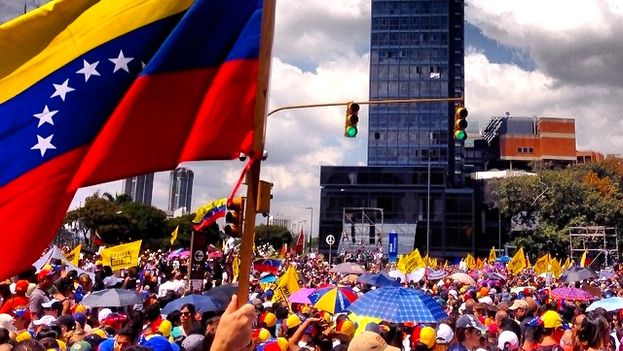
14ymedio, Miriam Celaya, Havana, 18 September 2014 — Lately, the Cuban personnel contracted by the Venezuelan Embassy in Havana are in the doldrums: there will be cutbacks among the long list of employees and no one knows exactly how many or who will end up “damaged.” It is rumored that when diplo-bureaucrats drop the guillotine–probably with the recommendations of the sinister Cuban advising commissioners–there will be a lot of Cuban workers “available.”
In case there is any doubt, not a single one of them is ever late or absent, though they were once the beneficiaries of all the Venezuelan petro-extravagances. All of a sudden, all personal problems, the irregular attendance, the requests for early leaves to attend parent-teacher conferences or doctors’ appointments ceased. As if by magic, discipline in the workplace has improved tremendously. No more playing computer games, gossiping about current TV soap operas which relieved the afternoon office boredom, and no more long telephone calls on the account of the Venezuelan exchequer.
The impending readjustment, however, should not surprise anyone. In recent months there were already signs that augured hard times: wages have been cut, lunches have lost their quality, size and variety, the “stimuli” and other benefits became more scarce, until they disappeared, as did the gargantuan parties for whatever reason, with eating and drinking galore, the ones that were attended by everybody, even the cat. Because, in the very Chavez and Bolivarian Embassy everybody was a big, happy family regardless of their rank and occupation, as befits genuine popular revolutions. continue reading
In Miraflores there is an alarming depletion of the “people’s” coffers and the time is now to limit the distribution and to cut the ribbons off the piñata
Everything points to an alarming decline, in faraway Miraflores, in the “peoples” coffers, and the time has come to limit distribution and cut the ribbons off the piñata so that only the highly anointed can reach them.
The cutbacks that the Venezuelan Embassy is applying in Havana are just an insignificant echo of a general strategy of patches and ineffective improvisations with which President Nicolas Maduro is trying to stop the most significant economic collapse that this rich nation has suffered in decades, which also include such draconian measures as a digital ration card–because poverty must keep pace with technological advances–an ill-advised policy of “fair prices” that triggered smuggling and corruption, as well as shortages of food and other staples in the markets, and also the irrational multiplication of the government’s bureaucratic apparatus to “control” the holes through which both capital and loyalties are escaping.
Preaching Poverty (of others)
The governments of democratic nations congratulate themselves when the standard of living rises under their administration. That said, any individual with a modicum of common sense should mistrust any government that declares that poverty is a virtue, and, as a consequence, a support for that country’s socio-political system. Such logic suggests that what that government will do then is foment poverty, since the more poor people there are, the more political capital there will be, and the more support the rulers will be able to count on.
In contrast, those who say they govern “for the poor” declare, as one of their main objectives, “to combat poverty”. However, in practice, they increase it and make it more acute, while they get richer. It’s axiomatic. One of the more conspicuous examples of this is the Nicaraguan Daniel Ortega, who had a meteoric metamorphosis from guerrilla to millionaire in his first term, when that “poor Nicaraguan people’s” revolution won out. However, poverty must have its charms, as Ortega was re-elected to the presidency in Nicaragua while Chavez, on his own time, was re-elected in Venezuela and, more recently, his disciple, Nicolas Maduro, was elected, though with a questionable margin. Meanwhile, the Cuban poor are so busy trying to survive poverty that for over half a century they have had no idea what presidential elections are.
These marginal and raucous sectors, prone to violence, are used by dictatorial regimes to suppress the disaffected.
Thus, the comment by Mr. Tarek el Aissami’s, governor of the state of Aragua, that loyalty to Chavez is greater the poorer the individual, follows the same principle of all “socialist” revolutions but it is not accurate: he did not refer to “the poor” as people of low income and few opportunities, but these marginal and raucous sectors, prone to violence, that are used by dictatorial regimes to intimidate and repress the disaffected. Afterwards, the Bolivarian project aims to sustain itself politically, not with the support of the poor–a growing sector–but with the terror imposed through these groups of thugs who have been sanctioned by the authorities to trample any civil complaint with impunity.
Because the truth is that, while the standard of living of Venezuelans has been falling hopelessly in recent years, particularly since the coming to power of Comrade Maduro, instead of Chavez’s supporters growing in numbers, protesters and anti-government protests have been increasing.
A bottomless barrel is not a barrel
It’s a given that every regime that tries to politically anchor itself on populist bases takes over the national and the private treasuries, not only as their own, but as if they were inexhaustible. Thus, they regard the coffers of the State to be bottomless barrels. Castro’s regime in Cuba is an old example of this, and Chavez’s Venezuelan regime today constitutes the most shocking paradigm if one takes into account the magnitude of wasted assets and the looting that have undermined that nation’s vast oil wealth in just 15 years.
Uncontrolled expenditures of the country’s wealth so it can develop “solidarity” programs with regimes akin to its ideals in the region, in an attempt to expand the old “socialist-imperialist” epidemic, expensive and unsustainable social programs, the squandering of public assets by the so-called Bolivarian bourgeoisie and its partners, among other bunch of nonsense, were not Maduro’s [In-Mature] initiatives but policies developed by him have precipitated and exacerbated their effects.
Thanks to the massive raid of Venezuelan oil treasure, we have witnessed the artificial extension of our vernacular dictatorship for almost 15 years
Today, when the economic absurdity of the Chavez project is reaching its highest point, and Venezuela, at the height of inefficiency and administrative corruption, is forced to turn to the international market to import the light crude needed to process its own oil, Nicolas Maduro’s fatal historical destiny emerges ever more clearly: the heir, by the will of the messianic departed, of authority that exceeds his meager capabilities, will end up assuming, all alone, the responsibility that should rest primarily on the founder of the madness, his mentor Hugo Chavez, now transmuted into an innocent little bird.
Thus, when the Chavez vessel eventually sinks in the waters of its own failure, its founder–who did not live long enough to pay the price of that hallucination he once termed “XXI Century Socialism”–will remain etched in the memory of millions of Latin American zombies as the philanthropist, the illustrious leader who plotted the itinerary; while Nicolas Maduro will pay the piper for a feast that will continue to cost today’s and tomorrow’s Venezuelans dearly.
Nice Cubans have much to feel sorry for in this regard, since, thanks to that massive raid of the Venezuelan oil treasury by the Chavez elite, we have been aided in artificially prolonging our vernacular dictatorship for almost 15 years.
Translated by Norma Whiting
Florida Two Hundred Yards Away / 14ymedio, Victor Ariel Gonzalez

14ymedio, Havana, Victor Ariel Gonzalez, 19 September 2014 – The Morava and Danube rivers come together in Devin. The place still belongs to the Bratislava region, but only the far shore is Slovakia. The near shore is Austria.
Maybe a detail that means nothing special. Even less because today you can cross from one side to the other without anyone saying anything to you and the barges loaded with tourists calmly navigate up and down the river. But before the Velvet Revolution, this was the border between communism and capitalism, between oppression and freedom; to try to cross, in many cases, implied paying a very heavy price. Say what you want to those who died, shot by the “proletarian” side, or to those taken by the strong current, but the rivers have never been as terrible as the politics of middle Europe.
It’s as if we Cubans had Florida 200 yards away, right in front of Mariel. Although we do have the Guantanamo Base and the sad death toll that claims those seeking to escape the island-prison. “The law of adjustment is to blame,” the border guards at Devin would have said in their time. Why not: We Cubans are all so observant of the laws…!
On a rock that strategically dominates the Devin landscape are the ruins of a fort. Our guide told us that people launched themselves from up there, during the Soviet heyday, hanggliding to try to get to Austria. It was a flight of freedom or death.
A portico in memory of the millions who crossed or tried to cross the Iron Curtain rises here today. A mute reminder of what should not be repeated. All borders have some capriciousness about them, but the one that was in place here until just 25 years ago was a sinister monument to the absurd. To the delight of all, the Warsaw Pact soldiers are long gone and today fishermen sit near where the waters of the Morava and Danube flow together. By the way, the wine in this region is very good.



